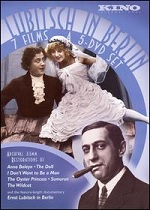- Totalt 0 kr
Lubitsch In Berlin
Lägg till en bevakning så meddelar vi dig så snart varan är i lager igen.
Lubitsch In Berlin
Anna Boleyn
The tragic story of the second wife of England's Henry VIII is given a first-class treatment by Lubitsch, complete with opulent sets and some beautifully-shot exterior sequences. Henny Porten (Kohlhiesel's Daughter, Backstairs) gives a memorable performance as Boleyn, but the film really belongs to Emil Jannings (The Last Laugh, The Blue Angel), one of Germany's greatest screen stars, playing Henry. Jannings's bravura performance conveys Henry's decadence through his insatiable appetite for both food and women, but never reduces him to caricature or pure villain. Jannings also establishes the screen model for Henry that would be further developed by Charles Laughton almost fifteen years later in The Private Life of Henry VIII.
Anna Boleyn was the second of Lubitsch's German films to be released in the U.S., following Madame Dubarry. It was a notable success with both the critics and the public, and helped to elevate Lubitsch's international reputation. After making three more films in Germany, Lubitsch accepted an invitation from Mary Pickford to come to Hollywood to direct her film Rosita - and the rest, as they say, is history.
Oyster Princess, The / I Don't Want To Be A Man
In The Oyster Princess (1919), a pampered American oyster tycoon decides to find a prince to marry his daughter, but things don't go quite as planned. Along the way, there are mishaps, misunderstandings and a foxtrot sequence that must be seen to be believed. In I Don't Want to Be a Man (1918), a teenaged tomboy, tired of being bossed around by her strict guardian, impersonates a man so she can have more fun, but discovers that being the opposite sex isn't as easy as she had hoped. What ensues is a gender-bending comedy that was decades ahead of its time. Each film is, in its own unique way, pure Lubitsch and a true classic of absurdist comedy.
Sumurun
This exotic spectacle stars Jenny Hasselqvist (The Saga of Gösta Berling) as Sumurun, a rebellious member of a harem who has committed the greatest of sins: she has rejected the old sheikh and instead fallen in love with a charming cloth merchant. Lubitsch expertly interweaves Sumurun's tale with several other related stories, and the result is a wonderful blend of melodrama and comedy. The cast also includes screen legend Pola Negri (Forbidden Paradise) as a traveling dancer who is drawn to both the harem and to the sheikh's handsome son, famed director-actor Paul Wegener (The Golem) as the tyrannical, lecherous old sheikh, and Lubitsch himself as a hunchbacked clown in love with Negr.
The Wildcat
At a remote fort, the commander awaits the arrival of a new lieutenant, who is captured en route by a band of outlaws that roam the nearby, snow-covered mountains. But the daughter of the bandits' leader quickly falls for the young officer, thus setting in motion an outrageous farce that is Lubitsch at his most unrestrained. Peter Bogdanovich has described The Wildcat as "an uproarious, hard-edged antimilitary spoof," and ranks the film among the five funniest movies he's ever seen (along with another early Lubitsch comedy, 1919's The Doll).
The Doll
The Doll is a charming romantic fantasy that shows the director already in full command of the now legendary "Lubitsch touch."
Presaging such playful sex comedies as Lubitsch's Trouble In Paradise and Design For Living, The Doll follows the misadventures of an effete young man who must get married in order to inherit a fortune. He opts to purchase a remarkable lifelike doll and marry it instead, not realizing that the doll is actually the puppet-maker's flesh and blood daughter, in disguise.
| Bild: | 1.33:1 FullScreen |
| Ljud: | Musik DD Mono |
| Text: | Engelska |
| Längd: | 438 Minuter |
| Skivor: | 5 |
| Region: | 1 |
Upplagd i sortimentet: 25 juni, 2013

